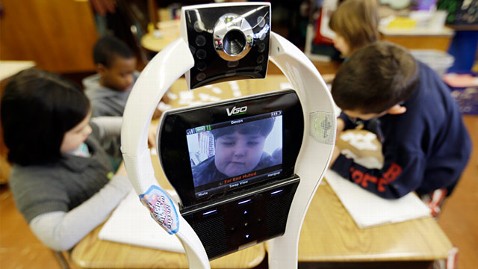Boy With Severe Allergies Attends School Via Robot
Devon Carrow spends his days like many other second grade students: He goes to school, says hello to friends in the hallway and practices his multiplication tables. But to do this safely, Devon cannot be in the classroom.
The 7-year-old from West Seneca, N.Y., has life-threatening allergies and the only way he can safely attend school is via a four-foot tall remote-controlled robot named VGo.
"[It's] really improved him and his quality of life and his self-esteem," said Devon's mother, Rene Carrow. "There's some kinks here and there along the way [but] it's the best thing that he's been able to participate in."
During school hours Devon remains in his bedroom at home, but his face is transmitted to a screen on top of VGo. Teachers can ask him questions, he can raise his hand or even share a joke with a classmate.
Between classes Devon can remotely navigate the robot through hallways and greet friends on his way to the next class. The only time he signs off is for lunch and gym class or during the occasional dead zone when the wireless internet signal goes out.
In June, Devon will wrap up his first full year attending school, even though he's never set foot in the building.
Before Devon was able to go to school remotely, Carrow said the local school district provided him with a tutor for about an hour each day. But by attending school, even remotely, Carrow said Devon spends more time in class and has more interaction with his peers. Devon said his favorite part of school is math class, "because of multiplications."
"He wants to do algebra," said Carrow. "[He'll say,] 'Oh, math homework, awesome.'" Devon is joined by a teacher's aide, who sits with him and can provide one-on-one attention if he needs it. His older brother picks up his assignments and delivers his homework to teachers each morning.
"It's given him a purpose," said Carrow of Devon. "He sets goals, and when he achieves them he feels awesome."
Carrow says Devon is allergic to peanuts, dairy, eggs and other food products. He is so allergic to nuts that even if his school banned all nut products, Carrow says, he could still be at risk for anaphylactic shock.
"If someone had peanut oil on their hands and touched him or if someone ate a peanut butter sandwich and breathed on him … it would be a death sentence," said Carrow.
Complicating Devon's health is that his reaction to certain allergens have shifted over time. He can now eat soy products after previously being allergic to them, but he had to stop eating dairy products after having a bad reaction.
Carrow also avoids laundry detergent or soap with fragrances since they can irritate the respiratory system; she said there are specific detergents that cause his throat to close up.
Dr. Neil Kao, an allergist for the Allergic Disease and Asthma Center, said young children not only have the highest incidents of allergies, but their immune systems are still developing, meaning that some children develop dangerous reactions to foods they previously could eat without problems.
"At this stage [with] their immune system being dysfunctional, sometimes not being in the school is the lesser of two evils," said Kao, who has not worked with Devon.
As a result of these restrictions, Carrow said it is difficult to let Devon do normal activities like go on sleepovers or visit friends.
"The little risks I take are what other people take for granted," said Carrow. "Like when I take him out [for an Icee.]"
Carrow said that even though Devon attends school remotely, he has quickly integrated into the environment. He has had school friends come over to his home and often "hangs out" with other kids in the hallway at school.
"He visualizes himself that he's actually there," says Devon's mom.
